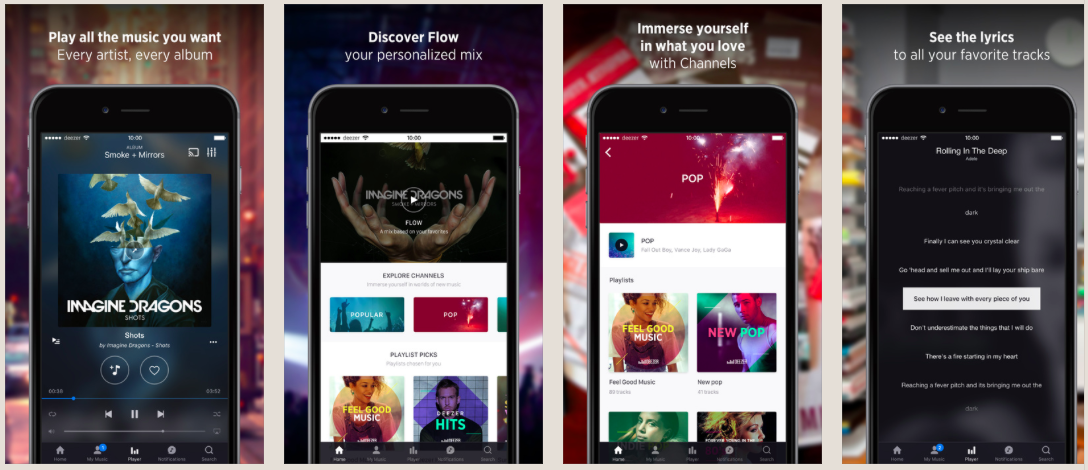As rumors swirl of yet more consolidation in the digital music market, a longtime player out of Europe already live in 180 countries is finally making a full entry into the U.S. in a play for more scale. Deezer, an on-demand streaming service that competes against the likes of Spotify and notably pulled out of an IPO last year, has today taken the wraps off a website and iOS, Android and Windows phone apps that will let all U.S. consumers stream music from its platform, which features 40 million songs and 40,000 podcasts.
But the launch comes at a price, quite literally. Although Deezer offers both free and paid tiers in other countries like the UK and France, it is bucking the trend of giving users an option of long-term, ad-supported free usage in its newest market.
Instead, after a 30-day trial, consumers must pay $9.99 per month to listen to music on demand, as well as get access to services like ‘Flow,’ which builds personalised radio stations for users based on their listening habits, music lyrics (which notably have been removed from Spotify for now at least) and more.

It’s not the only bold move from the company originally founded in Paris in 2007, with some 6.3 million users at last count. Deezer’s launching in the U.S. without any executive on the ground. Tyler Goldman, who had been the company’s U.S. CEO (and still indicates as much on his quirky LinkedIn profile), and led on a number of other growth initiatives in North America, quietly departed the company “a few months ago” according to Gerrit Schumann, Deezer’s chief international officer based in London.
Shumann has been leading on the rollout. He added that a new U.S. head is due to start in a few months, but because Deezer had already planned this rollout for this summer, it decided to proceed regardless.
“It’s not a one size fits all model for every market,” he said. “We were ramping up on the B2C model in the U.S. There were other opportunities to do this, but we did’t feel like the timing was right. Now, in terms of licensing and markets and the demand and our recent funding round,” — the company raised $109 million earlier this year — “everything is coming together.”
The company is launching relatively late and amidst a lot of other services already live in the U.S. They include Spotify, which first came to the U.S. in 2011 and now has over 30 million paying users globally (and many more free ones); and Apple Music, which has 15 million paying users and the advantage of being preinstalled on new iPhones and upgrades of iOS on older models.
But Deezer if nothing if not consistent. Back in 2012, under a different CEO (it’s now Hans-Holger Albrecht), Deezer also speculated that when it launched in the U.S. it would avoid a free tier.
“I’m not 100 percent sure we have to use a free service as a recruitment channel in the U.S.,” then-CEO Axel Dauchez said in 2012, noting that this can be a very unprofitable route to building revenues especially as a company scales up because of music royalty payments. “In some countries there is a difference between doing the most efficient thing and matching the competition.”
To be clear, today is not Deezer’s first move to offer services in the U.S. The company has taken a series of small and controlled steps to expand here over the last couple of years, all of them also banked on the belief that it’s better to catch a smaller number of paying users than to pick up scale with an ad-supported free offer.
Deezer’s moves have included acquiring Muve, Cricket’s (free!) music service, from AT&T, for under $100 million and attempting to migrate those customers to Deezer’s $9.99 paid tier. Schumann declined to say how many eventually made the leap.
“Technically it worked very well,” he said (emphasising ‘technically). “We had a good portion of the people try it out but it’s a different business model and you can’t really compare. There is a conversion to paid — not all of them but a good conversion.” It’s not clear in real terms what all this means, but he added that there was 200% growth on that service this year.
Deezer’s also partnered with companies like Sonos to expand its service in the U.S., in that case taking the high road by offering a paid, high-definition service to Sonos’ audiophile users for $19.99. Again, no word from Deezer on how well that offer has gone.
There have also other twists and turns in Deezer’s U.S. story. The company acquired a podcasting platform, Stitcher, and added its content to the Deezer platform with big plans to carve out a place for itself in the crowded on-demand music market as the place where you can also go for a wide variety of spoken word content. Stitcher was sold on to Scripps earlier this year in what was described as an acquihire. Indeed, Schumann said Deezer is actually still using content and tech from Stitcher in its service.
“Stitcher was a very vital acquisition for us on the tech and content side,” he said. “The podcasts are still available on Deezer. It was our entry point and we are adding more to the content in terms of talk. We’ve launched soccer streams in two markets and will continue to invest in content types.”
Perhaps most notable of all was Deezer’s attempt to IPO in 2015, which it had to postpone indefinitely after reportedly failing to generate enough investor interest during a roadshow. Instead, the company raised $109 million, and it’s part of this funding that is being used to make this leap into the U.S.
“The funding from existing investors demonstrates that they are really committed and we’ll look at IPO plans in the future,” Schumann told me.
One thing that the funding will not go towards — despite other moves of M&A in the industry right now around Pandora and reportedly Tidal going to Apple Music — is another acquisition to build up its audience.
“Right now we’re well set up to grow on our own,” he said. “In our past we made smaller acquisitions here and there but it’s about growing organically now. There will be further consolidation for sure, and there will be only a handful of global players. There won’t be 20-30 services five years from now, that’s for sure, and we’re set up to be a leader.”































Comment